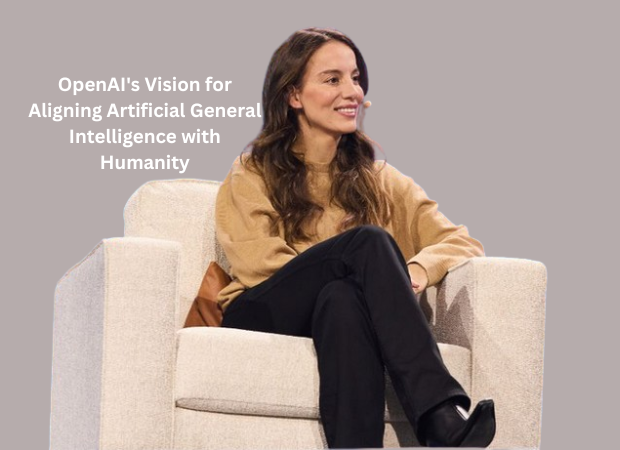OpenAI’s CTO, Mira Murati, stresses the platform’s efforts to achieve artificial general intelligence (AGI) while ensuring it remains controllable and doesn’t replace humans. Last month, OpenAI announced the opening of its first office in Asia, located in Japan. This move aims to tap into new revenue streams and foster long-term partnerships with local businesses, government, and research institutions. Murati’s emphasis on maintaining control over AGI highlights the organization’s commitment to responsible AI development. The establishment of a Japan office underscores OpenAI’s strategic approach to global collaboration and engagement, signaling its dedication to fostering diverse perspectives in shaping the future of AI.

OpenAI’s Breakthrough with Large-Language Models (LLMs)
OpenAI has long championed the scalability of large-language models (LLMs) through extensive computing power and data inputs. During a fireside chat at Qualtrics’ X4 Summit 2024, Mira Murati, OpenAI’s chief technology officer, expressed the company’s astonishment at the versatility and performance of these models across various domains. Particularly noteworthy is their proficiency in specialized tests, such as those in biology and mathematics, traditionally reserved for academic settings. This development underscores the transformative potential of LLMs in revolutionizing not just language processing but also domain-specific tasks, promising vast applications across diverse fields.
Murati’s Insights on the Impact of Advanced AI Technologies
Mira Murati, known for her leadership in developing and strategizing AI technologies like GPT-3 and ChatGPT, highlighted the remarkable capabilities of these models during a recent discussion. Murati emphasized that the impressive statistical performance of these AI systems enables them to tackle complex real-world problems, often with an almost magical quality. She pointed out the significant contrast between current technological adoptions and their historical counterparts, noting that sophisticated models like GPT-3.5 are now accessible at minimal or even no cost. This accessibility signifies a rapid integration of advanced AI technologies into society, promising transformative impacts across various sectors and domains.
CHATGPT: Technical Turbulence: OpenAI and Google Apps Encountering Errors
Impact of Advanced AI Adoption on Economic Dynamics
Mira Murati underscored the profound influence of swift AI adoption on economic dynamics, particularly with the integration of large language models into the workforce. She noted the rapid pace at which these technologies have permeated public consciousness and shaped regulatory frameworks. Murati highlighted the noteworthy emergence of governments establishing AI safety institutes and engaging with civil society, policymakers, and regulators on a global scale. These collaborative efforts seek to establish a robust infrastructure aimed at ensuring the beneficial and safe integration of AI technology into global society.
Transformative Potential of Large Language Models (LLMs)
Mira Murati, whose role involves not just technological development but also addressing the broader implications of AI on society focusing on safety and ethical issues, highlighted the tremendous opportunity presented by LLMs like GPT to revolutionize our relationship with knowledge and creativity across every domain. Murati expressed particular excitement about the potential in education and healthcare, recognizing the vast possibilities they offer to improve the quality of life worldwide. She explained that OpenAI is driven by a grand vision to enhance global living standards, enabling most people to access free, high-quality healthcare and education. This vision underscores OpenAI’s commitment to leveraging advanced AI technologies for the betterment of humanity on a global scale.
Advancements in Personalized Learning with AI in Education
OpenAI’s innovative approach is driving advancements towards more personalized learning experiences in education. Institutions such as Khan Academy and Carnegie Mellon are already utilizing OpenAI’s models to develop curricula tailored to individual students.
This shift towards personalization marks a departure from the traditional model of one teacher per 30 students, instead employing AI tutors capable of delivering customized motivation and education. This personalized approach enhances individual learning and creativity, catering to the unique needs and preferences of each student.
Furthermore, universities like Arizona State University and Harvard-founded Edx, a US for-profit online education platform, are harnessing AI technology to streamline administrative tasks and offer live support during lessons, further enhancing the efficiency and effectiveness of education delivery.
Advancements in Healthcare and AI Adoption
Mira Murati highlighted the promising but still emerging adoption of AI in healthcare, citing companies like Moderna and Unlearn AI leveraging AI to refine and expedite clinical trials, ultimately enhancing their robustness and efficiency. Additionally, companies like Soma Health are utilizing AI to alleviate the administrative burden on physicians, allowing them to dedicate more time to patient care.
Murati emphasized that we are only scratching the surface of the vast potential of these technologies. There exists an incredible opportunity for further innovations that could fundamentally enhance how we live and learn.
During a discussion moderated by Gurdeep Pall, president of AI Strategy at Qualtrics, Murati shed light on OpenAI’s vision for the future. When asked about the feasibility of bots and assistants thoroughly planning and booking trips, Murati outlined a gradual progression envisioned by OpenAI. This approach involves delegating increasingly complex tasks to AI systems over extended periods, indicating a methodical evolution toward advanced AI capabilities.
Advancements in AI Collaboration and Interaction
Murati explained that as AI systems gain access to more tools and OpenAI develops new user interfaces, the platform anticipates much more seamless and enhanced collaboration. “Soon, interactions with AI systems will start with specific, less ambiguous directions. However, as these systems’ underlying capabilities improve and the tools at their disposal become more powerful and diverse, these agents can handle more complex tasks and operate over longer timelines,” said Murati. “We are already observing the beginnings of this trend with systems like GPT-3 and others. Over the next few months, we expect significant advancements in this area.” MORE (OpenAI’s)